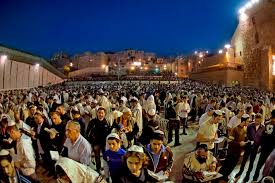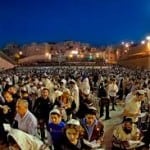Generally on the Shabbat before Rosh Hashanah, the days of judgment of the whole world, this dramatic verse from the Torah portion of Nitzavim is read in the synagogues. This simple fact is implied with the word HaYom(this day) used in the verse .The Baal Shem Tov taught that whenever the word ” HaYom – this day” is mentioned in the Bible it refers to Rosh Hashanah.
What then can we glean from the Torah portion’s first verse that might give us the courage and direction to stand before Hashem in the coming Day of Judgment (Rosh Hashanah)?
“You are all standing upright( Nitzavim) this day (HaYom) before ( Lifney) Hashem, your G-d the leaders of your tribes, your elders and your officers, every man of Israel,” (Deuteronomy 29:9)
The Chatam Sofer asked what is meant by the words “You stand this day,“? Were they not standing before G-d earlier at Mount Sinai? Were they not standing before Him at the shores of the Reed Sea? Why must we be told that here again they are standing? Also why must we be told that the standing was on “this day”?
The word/concept “Nitzavim/Hityatzvu” used in this portion teaches much.
We see this word used as they stood at the edge of the Red sea after the exodus from Egypt;
“And Moshe said unto the people: Fear ye not, stand still ( HitYatzvu) , and see the salvation of Hashem, which He will work for you today; for whereas ye have seen the Egyptians today, ye shall see them again no more forever. Hashem will fight for you, and you shall hold your peace.” (Exodus14:13-14)
We see it as they stand in anticipation at Mount Sinai;
“Moshe brought the people out toward G-d from the camp, and they stood ( VaYityatzvu) at the bottom of the mountain.”(Exodus 19:17)
We see its use again as the covenant is re-established in the days of Joshua
“And Joshua gathered all the tribes of Israel to Shechem, and he called the elders of Israel, and their heads, and their judges, and their officers; and they presented themselves ( yityatzvu) before G-d.”( Joshua 24:1)
Our sages point out that whenever the word (Yityatzvu ) is used it denotes a willingness and readiness to accept , renew and strengthen the covenant.
Yet we also note the use of the word/concept “Omeid”is used to denote standing;
“But not only with you am I making this covenant and this oath,but with those standing here( Omdim) with us today before Hashem, our G-d, and [also] with those who are not here with us, this day.”(ibid 13-14)
We see the use of Omeid again in the book of Numbers ;”Stand ( Imdu) here,’ replied Moshe. ‘I will hear what orders G-d gives regarding your case.”( Numers 9:8 )
What then is the difference between Nitzav and Omeid. The word/concept “Omeid” denotes a waiting to receive .It describes an act that is more passive. Nitzavim on the other hand represents the readiness to act on what has been received.
That is why the word ” this day( HaYom) ” (ibid 29:11) is so important.
“You stand this day, all of you, before Hashem your G-d “.
These words were spoken in the last 24 hours of Moshe’s life. Moshe is telling his people that he has endured the burden of being their protective covering for forty years. Now that they are about to enter the land, they must be prepared to enter the next phase of their Divine mission. Until “this day” they had been the tools that G-d had been using to reveal His involvement in this world. After “this day” they were becoming active participants in that very revelation.
Yet there is one more word/concept that needs to be explored.
“You are all standing upright( Nitzavim) this day HaYom) before ( Lifney) Hashem, your G-d “
What do the words “before Hashem” convey?
Adam and Eve, the first man and woman, knew G-d, and the Bible goes on to describe that Enoch and Noah walked with G-d. However, Abraham was given a different task: “Hashem appeared to Abram, and said unto him: ‘I am G-d Almighty; walk before Me, and be thou wholehearted.'” (Breishit / Genesis 17:1) Abraham is bidden to be courageous and walk before G-d, not next to Him. Abraham is asked to have the faith to walk into the unknown sensing that G-d is behind him at all times.
As we have noted the Baal Shem Tov taught that whenever the word ” HaYom – this day” is mentioned in the Bible it refers to Rosh Hashanah. We too stand before Hashem our G-d on this day that is coming upon us. We need to feel the words of our great teacher Moshe calling to us with the words;
You are all standing upright( Nitzavim) this day HaYom) before ( Lifneiy) Hashem, your G-d
We are all standing upright with the readiness and anticipation to move forward. Rosh Hashanah is less about what was and is more about what can be. We are all standing here again in spite of the twists and turns in our lives. We are all standing here ready to face the unknown, trusting that Hashem stands behind us.
That is the secret of being inscribed for a Good and Sweet Year.
Le Shanah tova tikatvu vetichatmu
Le-Refuat Yehudit bat Golda Yocheved

